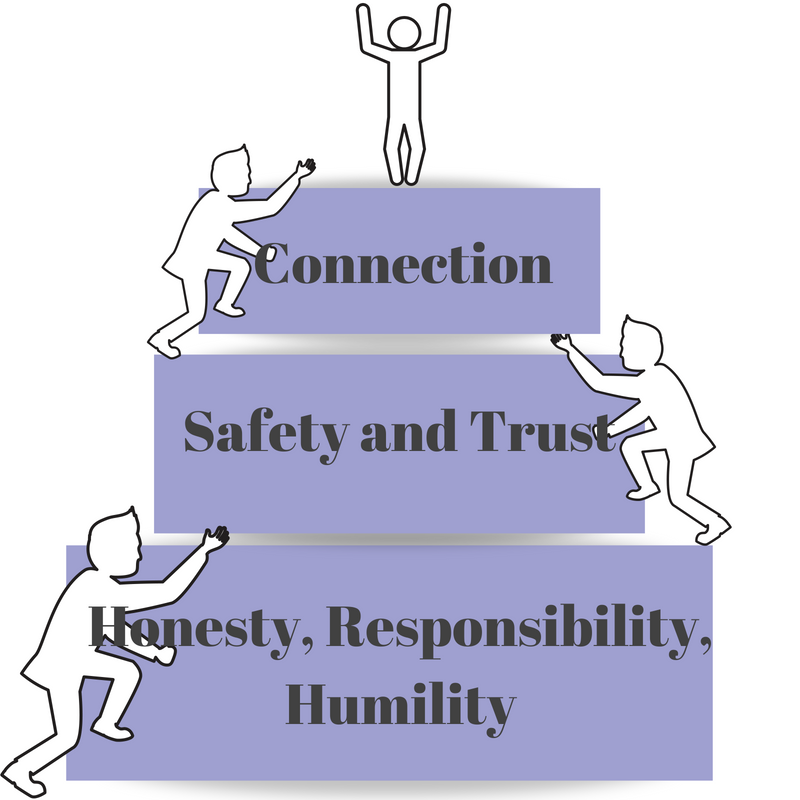Safety & Trust Are Earned Not Given
Jul 29, 2018Safety & Trust
A vital part of every healthy relationship is safety and trust. Without either the relationship becomes toxic and harmful. In order to build relationships that exist in connection you must start by living a life of honesty, responsibility, and humility.
|
To the left you can see the connections building blocks. The foundation of connection is living life in honesty, responsibility, and humility. This is why ConneXions focuses on the importance of honesty, responsibility, and humility (HRH). Living a life that incorporates all three of those requires effort and rigor. But, as you can see, living in honesty, responsibility, and humility allows you to build safety and trust. The natural outcome of safety and trust is connection.
|
When we choose to live in distortion, we are not living honestly, responsibly, or humbly. This means that we cannot have safety, trust, or connection—not with self, others, nor God. This week we will focus on the second building block of the diagram: safety and trust.
Safety
Safety is the foundation which trust is built on. Creating emotional safety is a solo act. It is your responsibility is to create safety for yourself, and others are the beneficiaries of the safety you have created. You create emotional safety by embodying characteristics of attention, validation, vulnerability, awareness, empathy, respect, honor, openness, responsibility, and honesty. As you apply these characteristics in your life you will create safety within yourself and others will feel safe around you. However, things like neglect, abuse, cynicism, acrimony, ridicule, lies, deceit, secrets, manipulation, drama, “victim,” lust, irresponsibility, and dishonesty violate safety.
Emotional safety can be easily recognized! It means that both people in a relationship are 1) aware of their own emotions, 2) honest with themselves and each other about their emotions, and 3) do not behave in ways that are aggressive—emotionally or physically. Emotional safety means both people in the relationship are honest with one another, and do not do anything to intentionally harm, hurt, undercut, belittle, disparage, deride, ridicule, slander, manipulate, or aggress against the other. Safety means knowing that your emotions and vulnerability will be held with respect.
Emotional safety can be easily recognized! It means that both people in a relationship are 1) aware of their own emotions, 2) honest with themselves and each other about their emotions, and 3) do not behave in ways that are aggressive—emotionally or physically. Emotional safety means both people in the relationship are honest with one another, and do not do anything to intentionally harm, hurt, undercut, belittle, disparage, deride, ridicule, slander, manipulate, or aggress against the other. Safety means knowing that your emotions and vulnerability will be held with respect.
Trust
|
Trust is not a free gift. Trust is an outcome that is earned by consistent honesty, responsibility, and humility (which creates safety). Trust is powerful, connecting, beautiful, God-like, and fragile. Once broken through dishonesty, selfishness, neglect, or abuse it is very challenging to rebuild and, depending upon the degree of the infraction, the person may never choose to trust you again.
|
We each are responsible to consciously choose whom we will and will not trust. While we do “give” trust to ourselves and others, trust should not be given where trust is not earned or evidenced that it can be managed. You would never give an eight-year-old a “gift” of a brand-new Lamborghini sports car and say, “Here are the keys. Do whatever you want with it. Just be responsible,” even if you “trust” that eight-year-old. You are aware that a child is unable to appreciate or be responsible with such a gift. To give them such a thing would hurt them and set you up for offense as well. When we choose to give our trust to someone who has not earned or evidenced that they can manage it, or they have not demonstrated their trustworthiness, comprehension, appreciation, and respect for our trust; we are setting both ourselves and the other person up for optional pain.



